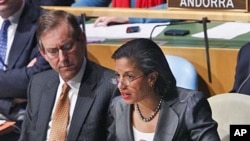The United Nations General Assembly has voted unanimously to suspend Libya’s membership in the U.N. Human Rights Council for gross human rights violations committed during its two-week crackdown on anti-government protesters. This is the first time a country has been suspended from the Geneva-based council.
More than 50 nations co-sponsored the measure, which was adopted by consensus. Lebanon’s U.N. Ambassador Nawaf Salam introduced the measure, saying the suspension is an exceptional, and hopefully temporary, measure.
The one-page resolution expresses "deep concern" about the human rights situation in Libya and notes that the General Assembly may suspend membership in the Human Rights Council if a member of that council commits gross and systematic violations of human rights.
U.S. Ambassador Susan Rice said the move is a harsh rebuke to Libya’s leadership, but one that it brought upon itself. She called again for Libyan leader Moammar Gadhafi to step down.
"He has lost any legitimacy to rule. He must go, and he must go now. The protests in Libya are being driven by the people of Libya. This is about the universal human rights of the Libyan people and all people, and about a regime that has failed to meet its responsibility to protect its own population," she said.
Speaking on behalf of African states, the representative of Mauritius expressed support for the suspension and said his region is deeply concerned about the ongoing situation in Libya.
"The international community must send a strong message to those who are responsible for violence against the Libyan people, and to the people of Libya expressing their legitimate aspirations, that it is not indifferent to gross and systemic violations of human rights, and that the international community respects the right of peaceful demonstrators to express their legitimate aspirations," he said.
Hungary’s Ambassador Csaba Kőrösi spoke on behalf of the European Union, stressing that the suspension is not a punishment for the Libyan people. "On the contrary, it is a resounding message of solidarity with them, and of extreme concern for their plight," he said.
The Human Rights Council is made up of 47 states whose responsibility is to strengthen the promotion and protection of human rights worldwide. Its critics say members include such human rights violators as China, Angola, Cuba and, until today, Libya, and that the council often unfairly targets Israel.
Also during Tuesday’s session, U.N. Secretary-General Ban Ki-moon briefed member states on the growing humanitarian crisis in Libya and along its borders with Tunisia and Egypt, where tens of thousands of migrant workers have fled the violence.
He announced he is planning to appoint a special envoy within the coming week who will work closely with regional governments and the international community to coordinate the United Nations response.
Libya Suspended from UN Human Rights Council




